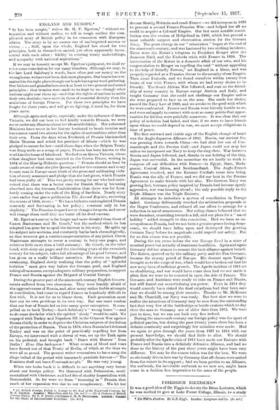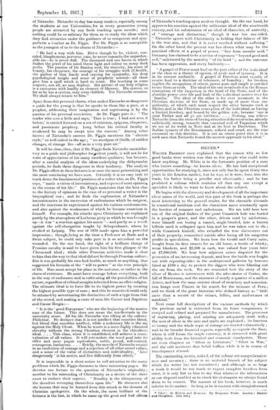FRIEDRICH NIETZSCHE.* Ix was a good itlea.ol Dr. Ifiggis to
devote the Bross Leeturee, which he was invited to give at Lake' Forest College,. Illinois, to a study • The Riffle Frahm.'fly J..11:11ggls. London; I.ongranns spa Co. tie. sell'
of Nietzsche. Nietzsche to-day has many readers, especially among the students at our Universities, for in every generation young people are attracted by any fresh teaching upon morals ; and nothing could be so salutary for them as to study the ideas which they find attractive under the guidance of so competent and sym- pathetic a teacher as Dr. Figgis. For Dr. Figgis is as susceptible as the youngest of us to the charm of Nietzsche:— " He had a way with him. Bitter though he be, violent, one- sided, blasphemous, perverse, vain, he never commits the unpardon- able sin—he is never dull. The thousand and one facets in which flashes the jewel of his mind throw light and colour on many dark paths. The passion of his flaming soul, his sincerity, his sense of beauty, his eloquence, the courage of his struggles with ill-health, the pathos of that lonely soul craving for sympathy, his deep psychological insight and sense of prophetic mission—all these give him a spell which is hard to resist. His teaching in some respects, not all, we may deplore. His picturo of our holy religion is a caricature with hardly an element of likeness. His system, so far as he has a system, may seem childish. Yet Nietzsche remains. We shall always return to him."
Apart from this personal charm, what, makes Nietzsche so dangerous a guide for the young is that he speaks to them like a poet, or a prophet, addressing their imagination and captivating it by the passion of his personal conviction. As Dr. Figgie puts it : " The reader who aces a little and says, That is true ; I had not seen it before,' is carried forward on a sea of criticism, epigram, eloquence, and passionate prophecy. Long before his critical faculty is awakened he may be swept into the current." Among other factora of Nietzsche's success Dr. Figgis mentions his electric style," co well suited to the age ; " an amalgam of thrills, of sudden changes, of strange fire—all as in a very pure air."
It will be clear, then, that if Dr. Figgie finds Nietzsche unsatisfac- tory as a guide and philosopher forordent youth, it will not be for want of appreciation of his many excellent qualities; but because, after a careful analysis of the ideas underlying the dithyrambic periods, he finds them dangerous in their tendency. The analysis Dr. Figgis offers in these lectures in at once the most painstaking and the moat convincing we have seen. Certainly it is no easy task to track down the fundamental positions of a writer who, as Dr. Figgie says, " made a virtue of inconsistency, and expressed most opinion, in the course of his life." Dr. Figgis maintains that the best clue to the history of opinions in the case of so personal a writer is the biographical one ; and he finds the explanation of Nietzsche's inconsistencies in the succession of enthusiasms which he outgrew, and the reactions he experienced against his various environments, and also against the weaknesses of which he became conscious in himself. For example, his attacks alma Christianity are explained partly by the atmosphere of Lutheran piety in which he was brought up—it was " a reaction against his aunts "—and partly as a revolt against the self-abnegation taught by Schopenhauer, whom he studied at Leipzig. The war of 1870 made upon him a powerful impression ; though, being at the time a Professor at Basle and a Swiss subject, he could only take part in it as attendant on the wounded. On the one hand, the sight of a brilliant charge of Prussian cavalry is said to have given him his first glimpse of the osr visa ideal ; while other Prussian activities made it clear to him that the way to that ideal did not lie through Prussian culture. But it was probably his own bad health, as much as anything, tlmt suggested his formula of the " will to power " as the true principle of life. Man must accept his place in the universe, or rather in the chaos of existence. He must have courage before everything, both in the way of endurance and in cultivating all the possibilities of his nature, regardless of ethical scruples inherited from an effete religion. The ultimate ideal is to force life to its highest power by creating the highest possible type of min ; and this he conceived could only bo attained by accentuating the distinction of such a typo from that of the crowd, and making a caste of men like Caesar and Napoleon
and Caesar Borgia:— •
" It is the ' good Europeans ' who are the beginning of the master race of the future. This does not mean the intellectuals in the university sense. All his life Nietzsche was tilting at the culture- Philiatine. He declares that it is not intellect that ennobles blood, but blood that ennobles intellect, while a sedentary life is the sin against the Holy Ghost. What he wants is a more highly educated chivalry without the strong Christian element in the chivalrous ideal.. . . This class, when it is established, will achieve a trans- valuation of all values. It will retranslate the word good into its older and more pagan equivalents, noble, proud, self-centred, courageous, barbarous.. . Briefly, the morals of Nietzsche consist in an exaltation of courage and a rejection of all other moral values, and a sense of the value of distinction and individuality. ' Live dangerously ' is his motto, and live differently from ahem."
It is impossible in a short notice to call attention to the many problems which Dr. Figgis discusses in these interesting pages. He devotes one lecture to the question of Nietzsche's originality ; another to his misreading of Christianity as a device of the slave races to enslave their captors. " Morality is the idiosyncrasy of the decadent revenging themselves upon life." He discusses also the lessons that may be learned from this attack in the domain of Christian apologetics. On the whole, the. most brilliant of the lectures is the last, in which he sums up the good and bad effects.
of Nietzsche's teaching upon modern thought. On the one hand, he approves his reaction against the utilitarian ideal of the nineteenth century, and his substitution of an ideal of character, of austerity, of " courage and distinction," though it was too one-sided. " Nietzsche agrees with Christianity in holding that fulness of life is the true aim, and that it is never reached without suffering." On the other hand, the present war has shown what may be the practical effects of a gospel of power, " free from moraine acid." Germany has claimed to be a nation of supermen " beyond good and evil," unfettered by the morality " of the herd ; and the outcome has been oppression, and every barbarity
" A gospel of Power must lead on the part either of the individual or the class to a theory of egoism, of pride and of tyranny. It is in its essence exclusive. A gospel of Freedom must equally of course lead to a dootrine of tolerance, of humility; for freedom implies the recognition of others, power pure and simple is satisfied to use them as tools. The ideal of the one is embodied in the Roman conception of the imperil:ea in the head of the State, and of the absolute power over life and limb of the individual master over his ' familia."The ideal of the other is for ever incarnate in the Christian doctrine of the State, as made up of more than one authority, of which each must respect the other because each is Divine, and in the Christian conception of the individual, as having a limited freedom, and bound by the golden rule, because ' one is your Father and all ye are brethren.' . . . Nothing can relieve Nietzsche from the stem of Imvinee at' hated the tendencies, already sufficiently strong, towards that evil of Paganism which we see at its worst in Nero and at its best in Diocletian. The Italian tyrants of the Renaissance, refined and cruel, aro the true comment on this doctrine. It is not an otiose point that it is in such men that Nietzsche found the nearest approach to his ideal."



























 Previous page
Previous page